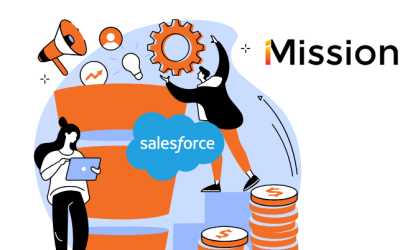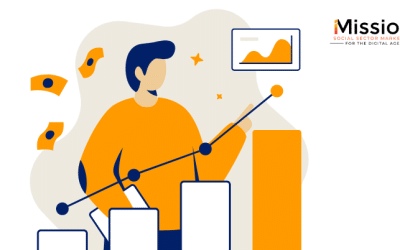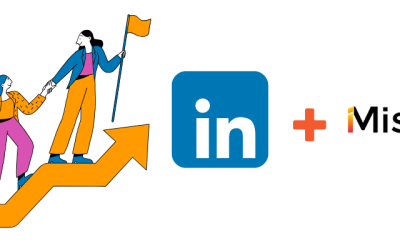Generative AI brings exciting new opportunities to improve, innovate, and transform the nonprofit sector.
Yet, a recent Google survey found that although four in five nonprofit professionals think generative AI may be applicable to their work, nearly half said their organization is not currently using the technology. They cite a lack of tools, awareness, training, and funding as the biggest barriers to adoption.
Google, Salesforce, and Microsoft each have launched initiatives to make generative AI more accessible to the nonprofit sector.
Below, we’ve pulled together a list of the nonprofits that have been selected for these accelerators, which we’re hoping inspire you to explore Generative AI and digital technologies at your nonprofit. Also provided is a description of the readily available AI capabilities that each company offers to the nonprofit community.
Google.Org Accelerator: Generative AI
Google.org has launched its Accelerator: Generative AI, a six-month program supporting nonprofits developing high-impact applications of generative AI.
21 organizations have already been selected, with focus areas including climate, economic opportunity, health, education, and crisis response. They’ll get technical training from Google, including workshops, mentors, and pro bono support from a dedicated AI coach. Google will provide more than $20 million in funding across the projects.
Organizations already selected for this program include:
- Benefits Data Trust is using large language models (LLMs) to build an AI-powered assistant that supports caseworkers and other front-line workers in helping low-income applicants access and enroll in public benefits.
- Beyond 12 is developing a generative AI-powered college coach that will provide coaching at scale to first-generation college students and students from under-resourced communities.
- CodePath will launch AI tutoring and mentorship solutions to provide immediate, personalized career support to underserved communities.
- Justicia Lab is creating an AI assistant to help immigrants understand their options for attaining legal status — providing them with actionable information throughout the process and offering customized guidance on their path to immigration relief.
- mRelief is creating an assistant to help with applying for Supplemental Nutrition Assistance Program benefits in the U.S.

Salesforce Accelerator — AI for Impact
Salesforce Accelerator – AI for Impact helps purpose-driven organizations leverage trusted generative AI technologies.
Through this initiative, selected nonprofits can gain access to flexible funding, pro-bono expertise, and donated technology to accelerate their purpose-driven, AI-based community solutions.
According to Salesforce, organizations in this program include:
Beyond 12 will automate the creation of tailored content sourced from more than 4,000 college websites. In turn, this will empower thousands of college students to achieve their academic, personal, and career goals. Beyond 12 has helped more than 150,000 students from under-resourced communities graduate from college and pursue choice-filled lives.
College Possible will create an AI-driven platform with personalized recommendations that will enable coaches to more adequately serve students from underinvested communities. Since 2000, College Possible has assisted more than 85,700 students, tripling college degree attainment rates.
Per Scholas will experiment with generative AI to unlock access to careers in tech by customizing resumes and cover letters that represent diverse skills and experiences. Since 1995, Per Scholas has launched more than 20,000 graduates into successful tech careers.
Teacher Development Trust will create immersive, AI-powered role-playing scenarios tailored for teachers and their coaches. Teacher Development Trust reaches over 4,000 educators across the UK, helping teachers create expert schools where students succeed.
Microsoft Targets AI Skills Gap with New Training Program and Grant Challenge
Microsoft has launched its AI Skills Initiative which includes a global grant challenge, free online courses, and a training toolkit for teachers.
The Generative AI Skills Grant Challenge, launched in collaboration with data.org, supports nonprofit, social enterprise, and academic or research institutions that use generative AI for social and economic good.
Organizations in this program include:
Mississippi AI Collaborative will develop an ecosystem of AI in the state of Mississippi spanning K-12 public schools, higher education, non-traditional education platforms, and small businesses.
The Myna Mahila Foundation is training Indian women, known as RANI workers, in generative AI to power a text-based AI platform designed to dispel misconceptions about women’s sexual and reproductive health.
The Global Integrated Education Volunteers Association’s (GIEVA) goal is to bring women entrepreneurs in northern Nigeria into the digital economy. GIEVA will train women entrepreneurs on the use of generative AI to create digital livelihoods.
Nonprofits Gain Access to Big Tech’s Generative AI Tools
The entire world has been buzzing over AI since the launch of ChatGPT in November of 2022. In the time since, thousands of startups have flooded the market with new product launches, bolstered by Venture Capitalist funding and hoping for a huge payday. While the entire AI industry is flush with speculative cash, the total funding for these nonprofit accelerators is still fairly modest — and space is limited.
The good news is that there are larger initiatives to help nonprofits gain access to the power of Generative AI so they can improve, innovate, and transform.
For example, Salesforce provides eligible nonprofits and educational institutions with 10 free licenses for its core nonprofit applications where they can use Einstein GPT to deliver hyper-personalized experiences at scale for donors, volunteers, clients, and students.
Einstein uses different criteria to predict how likely a contact is to become a first-time donor, recurring donor, or top donor.
Einstein for Nonprofits examines data on donors’ contact records, including how much they’ve given and their first gift date. It then takes this data to find trends to predict future outcomes.
Nonprofits can use these predictions for person-to-person outreach or as segments in marketing campaigns for more effective fundraising.
Eligible nonprofits can also access Microsoft 365 Business Premium for free for up to 10 users, with discounted pricing for additional users. This includes AI tools like Copilot for Microsoft 365, which integrates large language models with Microsoft Graph and Microsoft 365 apps, helping organizations create content efficiently, secure personalized messages for donors and volunteers, write compelling grant proposals, and maintain an active online presence.
Google for Nonprofits offers a variety of free and discounted Google products to qualified nonprofits, including Google Workspace and Google Ads. Many nonprofits are already successfully using the Google Ad grant with AI-powered features like responsive search ads to target their audience effectively. With Google Workspace, nonprofits can access Google’s Gemini GPT.
iMission Institute is a digital solution provider on a mission to enable and empower its nonprofit clients to use technology – from strategy to implementation. Get in touch to learn more.



